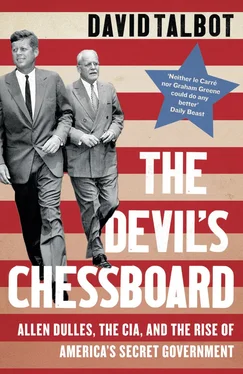The State Department later sent the OSS a summary of the report that had originated with Schulte. Allen Dulles, still working out of the OSS offices in New York at the time, was one of those who received the message. The State Department flatly refused to believe Schulte’s account, calling it a “wild rumor inspired by Jewish fears.” Even Harrison’s concession that some Jews were dying as a result of the “privations” of war was stripped out of the State Department memo.
The State Department decided not to notify Rabbi Wise—whom Foggy Bottom officials considered a thorn in their side—about his Geneva deputy’s efforts to reach him. It took a full month for Rabbi Wise to receive Riegner’s report. When the telegram finally arrived in New York on August 28, it came not through U.S. diplomatic channels, but British. The State Department also did not see fit to pass along the Schulte revelations to President Roosevelt.
In frustration with the information bottleneck, Rabbi Wise finally held a press conference two days before Thanksgiving, announcing that Hitler had already killed about two million European Jews and had plans to exterminate the rest. The New York Times buried the story on page 10, The Washington Post on page 6. The press was reluctant to highlight such an explosive story since it lacked official government sources.
Dulles, who was soon headed to Switzerland, could have been one of these sources for the U.S. press. While still stationed in New York, he began sending out veteran reporters—under diplomatic cover—to gather intelligence in various forward posts in the European war zone. One of these reporters, a thirty-seven-year-old, Berlin-born, multilingual, former NBC correspondent named Gerald Mayer, was sent to Bern in April 1942. Soon after Schulte’s report began circulating, Mayer also began filing stories about the Final Solution with the New York OSS office. “ Germany no longer persecutesthe Jews,” began Mayer’s first stark dispatch. “It is systematically exterminating them.”
But Dulles did nothing to publicize Mayer’s reports. They, too, remained buried in the government bureaucracy. Along with the Schulte bombshell, these alarms would have made a loud noise, particularly in the New York echo chamber. They might have finally blown apart Washington’s institutional inertia on the refugee question. But this was not part of Dulles’s agenda.
History would give Dulles one more chance to alert the world to the ongoing genocide. In Switzerland, he would hear directly from men like Schulte and others who had risked their lives to save the Jews. In Bern, the evil was not so remote—it was all around.
After arriving in Switzerland, Dulles took his time setting up a meeting with Eduard Schulte. When the two men finally did come together in spring 1943 for a furtive meeting in Zurich, it was an amiable enough occasion; they had met fifteen years earlier, they realized, in the New York offices of Sullivan and Cromwell, which represented Anaconda Copper, a partner of Schulte’s mining firm.
The fate of the Jewish people was still of great urgency to Schulte—likely made even more urgent by the fact that during his trips to Switzerland, he had fallen in love with a younger Jewish woman who lived in Zurich. But Dulles expressed little interest in Schulte’s information about the Final Solution. More intrigued by the political and psychological mood of the German people and how they could be won over by the Allies, Dulles asked Schulte to write up a memo on the state of the German nation. It was Hitler’s people, not his victims, whom the intelligence official thought important to understand.
This was characteristic of Dulles’s meetings with German informants while he was stationed in Bern. Fritz Kolbe, an efficient foreign service official who kept rising to higher posts in the German government despite his stubborn refusal to join the Nazi Party, was another mole who risked his life to give the United States rare insights into the operations of the Reich. One night, with documents stuffed down the front of his pants, Kolbe crossed into Switzerland and made his way to Dulles’s residence in Bern. Like Schulte, Kolbe was well aware of the risk he was taking. After this first meeting with the American spy, Kolbe drew up his will. He also left Dulles a letter for his young son in case he was caught and executed. Dulles was untouched by Kolbe’s request. The OSS agent sized him upas “somewhat naïve and a romantic idealist,” which was not good for Kolbe, since Dulles always regarded these types as expendable.
But Kolbe had important information to impart, and he kept risking his life to smuggle Nazi documents across the border. During another meeting with Dulles, in April 1944, Kolbe handed over a thick sheaf of Nazi cables revealing that Hungary’s Jews, who had remained secure late into the war, were about to be rounded up and deported to the death camps. Dulles’s report on this meeting was one of the few from Bern that ended up on the president’s desk in the White House. But there was nothing in Dulles’s communiqué about the imminent fate of Hungary’s Jews. And there was nothing about the possibility of bombing rail lines to the death camps—and even the camps themselves—as informants like Schulte were urging the Allies to do.
Instead, Dulles chose to focus the president’s attention on another topic that he had discussed with Kolbe over glasses of Scotch in his drawing room. Underground Communist organizing seemed to be gaining strength in Germany as the Nazi war effort faltered, Kolbe had informed the U.S. agent. This was the emergency that Dulles thought the White House needed to hear about.
Dulles continued to receive Nazi documents about the fate of Hungary’s Jews from Kolbe over the next seven months. One German cable reported that 120,000 Jewsin Budapest, including children considered unfit for work, were soon to be “taken to the Reich territory for work in the labor service.” The Nazis were always careful to use euphemisms like “labor service” in their communications. By this date, Washington was well aware that Hungary’s Jews were headed to Auschwitz. And yet Dulles’s communiqués to OSS headquarters used the same banal language as the Nazis, referring blandly to the “conscription” of Hungary’s Jews.
When Dulles’s communications from Bern to Washington were declassified decades later by the government, scholars were able to decipher his wartime obsessions. Dulles’s interest was absorbed by psychological warfare tricks, such as distributing counterfeit stamps behind enemy lines depicting Hitler’s profile as a death’s skull, and other cloak-and-dagger antics. He was also deeply engaged with mapping out grand postwar strategies for Europe. But few of his more than three hundred communiqués mentioned the killing of Jews—and none carried a sense of urgency about the Final Solution.
This glaring blank spot in Dulles’s wartime record continues to confound academic researchers decades later, though they remain reluctant to pass judgment on the legendary spy. “ Why did Dulles choose not toemphasize the Holocaust in his reports to Washington?” wondered World War II historian Neal H. Petersen in his edited collection of Dulles’s OSS intelligence reports. Petersen clearly struggled to answer his own question. “Whatever his reasoning,” Petersen concluded with scholarly restraint, “his reticence on this subject is among the most controversial and least understandable aspects of his performance in Bern.”
In April 1944, Rudolf Vrba, a nineteen-year-old Jew from a village in Czechoslovakia who had survived for nearly two years in Auschwitz, escaped from the campwith Alfred Wetzler, a childhood friend, by hiding in a pile of wood planks for three days and nights without food or water. They tied rags across their mouths to muffle the coughs that would have betrayed them to the SS patrols that were methodically searching the camp for them. On the third night, when they finally felt it was safe to make their escape, Rudi and Fred emerged from the pyramid of wood and began crawling under the moonless sky across a muddy field toward a cluster of birch trees in the distance. The two friends were determined to return home, not just to save their own lives but to bear witness to what was happening inside Auschwitz.
Читать дальше











